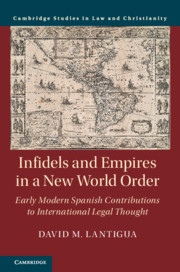(Source: CUP)
Cambridge University Press is
publishing a new book on Early Modern Spanish contributions to international
legal thought.
ABOUT THE BOOK
Before international relations in
the West, there were Christian-infidel relations. Infidels and Empires in a New
World Order decenters the dominant story of international relations beginning
with Westphalia in 1648 by looking a century earlier to the Spanish imperial
debate at Valladolid addressing the conversion of native peoples of the
Americas. In addition to telling this crucial yet overlooked story from the
colonial margins of Western Europe, this book examines the Anglo-Iberian
Atlantic to consider how the ambivalent status of the infidel other under
natural law and the law of nations culminating at Valladolid shaped subsequent
international relations in explicit but mostly obscure ways. From Hernán Cortés
to Samuel Purchas, and Bartolomé de las Casas to New England Puritans, a host of
unconventional colonial figures enter into conversation with Francisco de
Vitoria, Hugo Grotius, and John Locke to reveal astonishing religious
continuities and dissonances in early modern international legal thought with
important implications for contemporary global society.
ABOUT THE AUTHOR
David M. Lantigua, University
of Notre Dame, Indiana
David M. Lantigua is Assistant
Professor of Moral Theology and Christian Ethics at the University of Notre
Dame, Indiana. He was previously a faculty member at The Catholic University of
America and was a former graduate fellow at the Notre Dame Institute for
Advanced Study. He co-authored, with Darrell Fasching and Dell deChant,
Comparative Religious Ethics: A Narrative Approach to Global Ethics, 2nd
edition (2011). He is also co-editor of Bartolomé de las Casas and the Defense
of Amerindian Rights: A Brief History with Documents (2020), part of the Atlantic
Crossings series.
TABLE OF CONTENTS
1. Introduction. International
relations beyond Westphalia
Part I. The New World Crucible of
Infidel Rights:
2. Theocratic world order and
religious wars
3. Spanish Dominicans and the
'affair of the Indies'
4. The politics of natural law at
Valladolid, 1550–1551
Part II. God, Empires, and
International Society:
5. From infidels to savages:
empires of commerce and natural rights
6. The scholastic law of nations,
native occupation, and human solidarity.
More info here


No comments:
Post a Comment
Note: Only a member of this blog may post a comment.